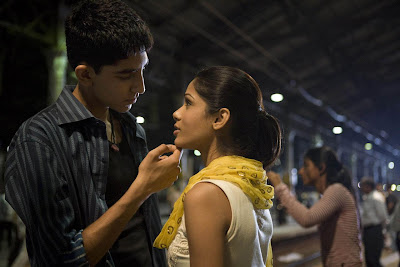
Before I write the answers to my questions, I would like to thank you, teacher, for giving me the chance to see this wonderful movie. I've wanted to see it since I saw an interview to Dev Patel (Jamal) at "The Daily Show with John Stewart". Now, you've given me the opportunity to see it before it appears at theater. I liked it so much...
It's the best film I've seen in a while.
So here are my questions and answers:
What does the title mean? How does the title and the contrasts within it provide symbolic summary of the film?
The title is a reference to Jamal, and how he, a chaiwallah, turned from day-to-night into a millionaire by answering the questions of a TV program. It gives a symbolic summary of the film because Jamal, who grew up at Mumbai slums, and lived turbulent and sometimes cruel experiences, won a general culture quiz, when he's supposted to be ignorant and supposted to lose.
In the film, the theme of destiny is a central theme. What does it mean that all Jamal desires is just out of his reach? (The prized autograph, Latika, his brother, the answers, etc.)
It's suppost to mean that poor people never get what they want. But it was in Jamal's "destiny" to finally get what he most desired, the love of Latika. And what he desired the most in the past helped him in the end, as every single thing he used to desire turned into a question and an answer which helped him win the contest. So all that was out of his reach was actually ment to be out of his reach, as it would help him fulfill his destiny...
Is ethical decision making possible when one must make choices based on survival? Do seemingly “bad” choices make a person bad?
Making bad choices doesn't make someone bad, as that person might be ashamed of what he did and even regret doing those things. That is the case of Jamal's brother, Salim. He was taught through that doing certain things would lead him to an easier, happier life. Later on, he understood that those things really didn't brought him happyness, but rather suffering... But he was trapped, the only way to survive was to carry on with his life of crime. Even if he thought what he was doing was wrong, he had no other choice. So I think ethical decicions can't be made when the choices one makes are based on survival.
So long and thanks for all the fish...
Incredible job Erick! Definetly an example of what a good job is like. Perhaps there are a few spelling errors, but aside of that, everything is correct.
ReplyDeleteI agree with all of your questions, especially the last one. Not every person is guilty because of making a bad decision based on other's hypothetical error. I cannot say more. Your thesis is correctly proven.
I totally agree with you Erick, making bad choices doesn't make people bad, and that's a personal experience that I'm proud to say it's proven, it doesn't matter how many times you did mistakes in the past, it's what you're doing, and what you're gonna do what really counts, Past, you're the cake man :D.
ReplyDelete